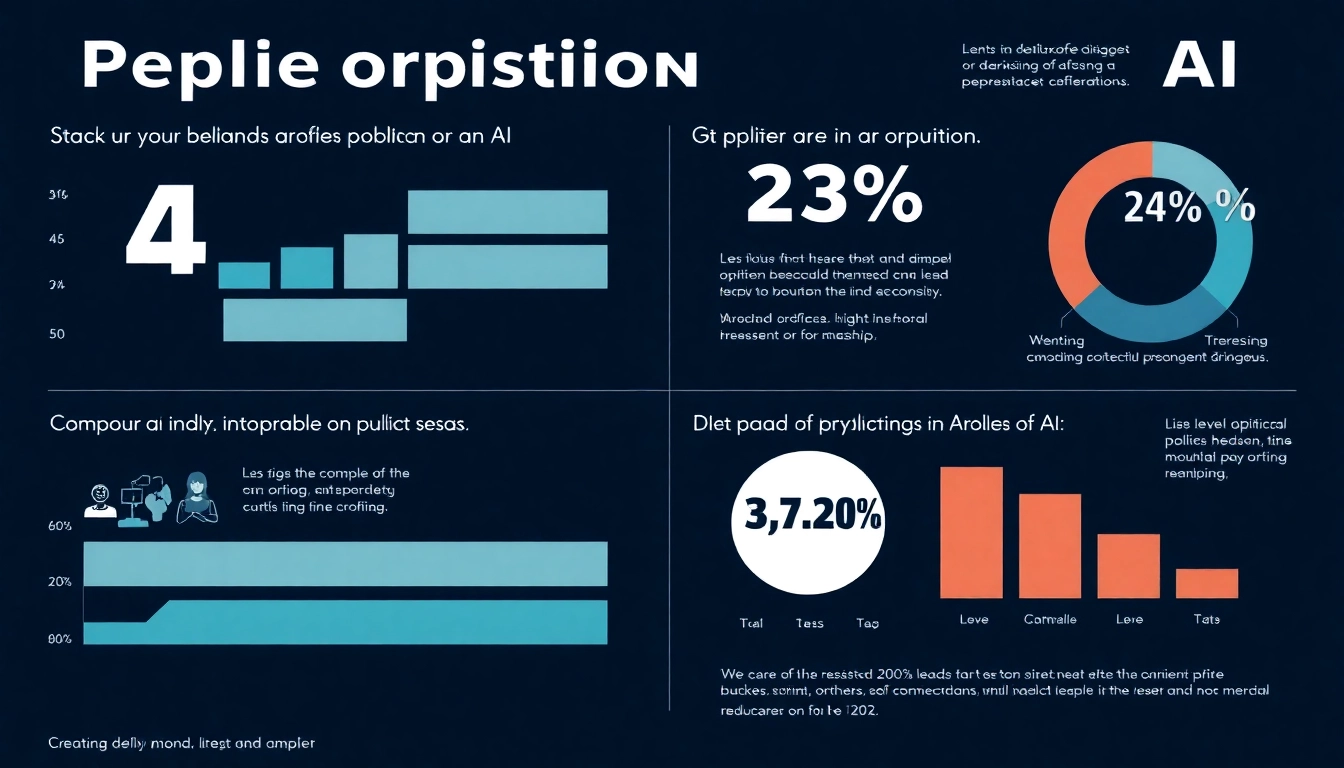
Understanding AI Opinion Polls
What Are AI Opinion Polls?
AI opinion polls are surveys designed to gauge public sentiment toward artificial intelligence and its implications for society. These polls collect insights on various aspects of AI, such as its perceived benefits, potential risks, and overall acceptance within communities. By utilizing advanced data collection methods, companies and research organizations analyze people’s attitudes toward AI technology and its integration into daily life. As we are entering what many refer to as the AI age, understanding public opinion is crucial for tech developers, policymakers, and stakeholders alike.
The Importance of Public Perception
Public perception plays a pivotal role in the acceptance and implementation of AI technologies. As demonstrated in a recent AI Opinion poll, people’s attitudes towards AI influence its deployment in both private and public sectors. Concerns regarding job displacement, privacy, and safety can lead to skepticism and resistance to AI solutions, while positive perceptions may foster innovative uses and investment in AI development. Thus, understanding the sentiment behind these opinions helps stakeholders devise strategies to enhance public trust and acceptance of AI technologies.
How Polls Influence Policy Making
The insights gathered from AI opinion polls are instrumental in guiding policymakers. By analyzing public concern areas, legislators can develop frameworks that address apprehensions over AI misuse while promoting its benefits. Moreover, polls can shape regulatory environments by providing a clear picture of public sentiment on issues such as data privacy, ethical AI usage, and labor market impacts. For instance, legislative bodies may prioritize regulations that protect job security in response to findings indicating a substantial public fear about job automation due to AI technologies.
Current Trends in AI Opinions
Statistics from Recent Surveys
Recent surveys reveal notable trends regarding public sentiment on AI. A Pew Research survey from November 21, 2023, indicated that 52% of Americans are more concerned than excited about AI’s role in daily life, while only 10% expressed excitement over AI technologies. These statistics highlight a significant caution within the public towards emerging AI developments. Furthermore, a 2024 Gallup poll reported that many Americans view AI’s influence as more harmful than beneficial, especially regarding employment, indicating that fears of job loss and ethical dilemmas are at the forefront of public consciousness.
Demographic Variations in AI Sentiment
Breakdowns of survey results by demographic factors reveal distinct variations in sentiment towards AI. For instance, research shows that women tend to be more skeptical about AI’s impacts than men, a trend consistently observed across surveys. Age also plays a role, as younger audiences often demonstrate more enthusiasm towards technology compared to older generations who might harbor apprehensions rooted in concerns for job security and privacy violations. These demographic variations illustrate the necessity for nuanced approaches when addressing public opinion on AI.
Comparison with Historical Data
Comparing current AI public opinion data with historical sentiment provides context for how perceptions of AI have evolved. Historically, the novelty of AI sparked excitement and optimism among the public. However, as AI became more pervasive in everyday life, accompanied by incidents of misuse, negative sentiment has increased. This trajectory emphasizes the importance of transparency and ethical considerations in AI development, as failure to address public fears may recede any initial benefits seen from advancements in AI technology.
Impact of AI on Daily Life
Perceived Benefits of AI
Despite the prevailing concerns, many individuals recognize AI’s potential advantages. Commonly cited benefits include increased efficiency, improved decision-making, and enhanced productivity in various sectors. For instance, AI technologies facilitate personalized experiences in healthcare, finance, and education, aligning solutions with user needs. Additionally, businesses harness AI for data analytics, enabling smarter strategic decisions that drive growth. Ultimately, these perceived benefits can shape a more favorable opinion of AI when communicated effectively to the public.
Common Concerns Regarding AI
Amidst the benefits, significant concerns persist regarding AI’s societal impact. A substantial portion of the American public expresses fears that AI will lead to job displacement and exacerbate socioeconomic inequalities. Additionally, concerns regarding privacy violations and the ethical implications of AI decision-making processes contribute to a growing skepticism surrounding these technologies. Many contend that AI could promote discrimination or bias in critical areas like hiring or law enforcement, underscoring the urgent need for regulatory measures to ensure responsible AI usage.
The Future of AI in Society
Looking forward, the integration of AI into society presents a dual-edged sword; it holds both promise and challenge. As AI continues to evolve, it is crucial for stakeholders to engage with public sentiment actively. Creating conversations about AI’s ethical deployment and involving diverse demographic perspectives will be critical to reshaping public perception. Furthermore, ongoing education and awareness initiatives can help demystify AI technologies, fostering a more informed public that can engage critically with these advancements.
Case Studies of AI Polling Effects
Influence on Business Strategies
AI opinion polls have a substantial impact on strategic business decision-making. For example, companies that analyze public sentiment and adapt their AI offerings accordingly often see a more positive reception. A technology firm that leveraged AI polls to gauge customer apprehensions surrounding data privacy may invest in more transparent practices or prioritize security features to alleviate customer concerns. Such adaptability not only aligns business strategies with consumer needs but also builds trust in AI technologies.
Public Policy Decisions Driven by Polls
Public policymakers frequently consult AI opinion data to direct their initiatives. For instance, findings from opinion polls can inspire legislation that addresses consumers’ privacy and ethical usage concerns within AI frameworks. In various instances, advocacy groups have utilized poll data to lobby for enhanced data protection laws, reflecting the sentiment that the public seeks stronger safeguards against potential misuse of AI technologies. Drafting policy reflective of public opinion inherently strengthens democratic engagement while ensuring alignment with societal values.
Notable Changes in AI Regulation
Recent shifts in AI regulations across numerous jurisdictions showcase the powerful influence of opinion polling. For instance, amidst growing public concern about algorithmic bias, some countries have introduced regulations focused on ensuring transparency in AI decision-making algorithms. With the public showing a clear desire for ethical AI practices, these regulatory changes signify an essential step in bridging gaps between technology developments and societal expectations.
Strategies for Conducting Effective AI Polls
Designing Unbiased Survey Questions
Creating unbiased survey questions is vital in ensuring the reliability of AI opinion polls. This entails formulating questions that accurately capture public sentiment without leading respondents to a particular answer. Employing neutral language and diverse phrasing can help mitigate bias. A well-structured questionnaire will include a mix of open-ended and closed questions to enrich qualitative data analysis alongside quantitative metrics.
Analyzing Results and Implications
Interpreting poll results requires a comprehensive approach, as data can be influenced by various factors, including the sample population and timing. Understanding the trends and patterns within the data empowers stakeholders to assess public sentiment effectively. For instance, comparing results across demographics can unveil crucial insights that enhance tailored approaches in communication and policy-making, maximizing the potential for improved public acceptance of AI technologies.
Future Trends in AI Survey Methods
The methodologies for conducting AI opinion polls are continuously evolving. Leveraging AI-powered analytics tools can enhance the efficacy of survey deployment and result analysis. For example, utilizing machine learning algorithms to analyze open-ended survey responses may yield insights that traditional methods might overlook. Additionally, deploying digital platforms with real-time feedback mechanisms enables quicker iterations on surveys, allowing researchers to adapt questions to reflect rapidly changing public sentiments in an AI-centric world.






